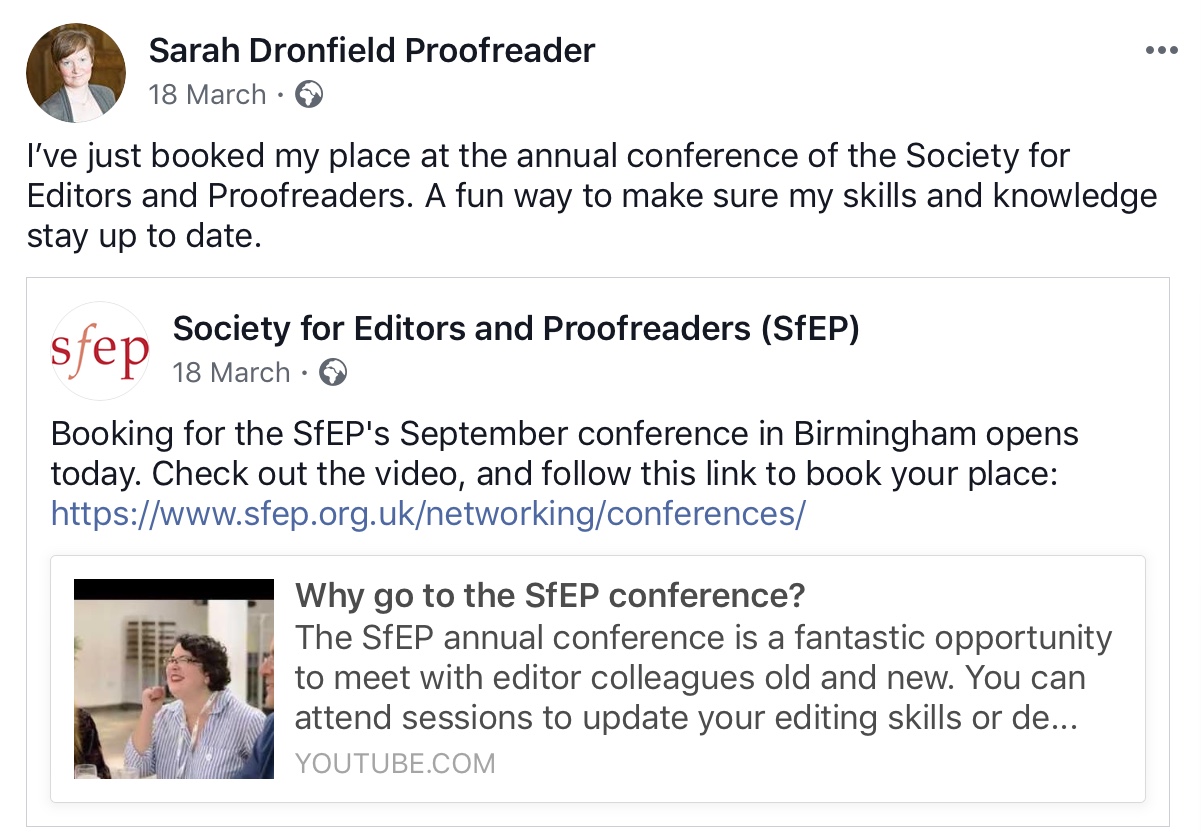In the fourth instalment of our series about how editors use social media for their businesses, Sarah Dronfield talks about what Facebook has brought to her editorial life.
Why and when did you start?
When I started my editing and proofreading business in 2016, I already had a personal Facebook profile so, because it was easy (and free) to do, one of the first things I did was to set up a business page linked to that account. I didn’t know whether I would find clients via the page, and to be honest I’m not sure I ever have, but I do know that it drives traffic to my website.
I soon discovered, however, that Facebook could benefit my business in lots of other ways. Early on, I found out about a group called Editors’ Association of Earth (EAE): a place for ‘editors from anywhere to meet, have fun together, and talk about the issues and challenges that all editors share’. There and in similar groups, I learned a lot about editing in ways that aren’t possible from a book or a course. This was mostly from reading advice from or having conversations with people who have been editing for decades, but also from reading the many blog posts that were shared. In fact, there were so many great blog posts around, I thought it would be useful to have somewhere they could be ‘stored’ and easily found, so early in 2017 I suggested to the EAE admins that I start a weekly thread in the group, where the latest blog posts could be shared, with hashtags so that older threads could be found again quickly.
The idea for the weekly thread was partly inspired by an accountability thread in a closed EAE group – a place for editors to share what they’ve done that week to market their business or advance their professional development. When the person who was managing this thread said they wanted to step down in late 2017, I volunteered to take it on too.
I also set up a Facebook page (and Twitter account) for our SfEP local group back in 2016; I volunteered to do this at my very first local group meeting, and I’ve been managing the page ever since.
What do you share?
On my business page, I mostly share articles and blog posts I think will be of interest to potential and existing clients; I work mainly with Welsh authors of thrillers, historical fiction and children’s books. My pinned post is a glowing testimonial from happy co-author clients, and it’s the first thing new visitors to the page will see. And of course, when I write a blog post of my own (which isn’t often these days) then I share that too. I also share news of upgrades to my SfEP membership or about training courses I’ve taken, for example.
On our local group page I share information about group meetings and things that may be of interest to potential clients (about writing and editing generally because between us we provide a wide range of services).
When do you share?
I try to share something to my business page at least once a month so visitors can see the page is active. I avoid posting too often because I don’t want to flood my followers’ news feeds, although I’m sure I could post more often than I do without annoying people.
Our local group page is really just there to send people to the South Wales Editors website, so I only post there very occasionally.
In the EAE groups, I share the blog post round-up every Monday and the accountability thread every Friday.
Why do you do it?
I came for the marketing, but I stayed for the advice, support and camaraderie. I may or may not have gained clients from my business page, but I have had work as a result of networking and making friends with other editors on Facebook.
What about other social media platforms?
In 2016, at the same time as I set up my Facebook business page, I also set up accounts on Twitter and LinkedIn. I rarely visit LinkedIn because I don’t like the platform and I don’t think it’s where my ideal clients are. I do like Twitter though, and I actually post there more often than I do on my Facebook page. But Facebook is definitely my favourite platform because I get so much more out of it. My business simply wouldn’t be where it is today without the huge amount of information, advice and support I have received from colleagues there over the last three years.
Any advice?
Explore the many Facebook groups for editors, spend time in them and find out which ones are most useful to you. There are all kinds of groups: for all things related to editing, groups specifically for academic or fiction editors, groups that focus on business or training, and many more. You can even start your own accountability group – find a few like-minded colleagues who are at a similar stage in their career and set up a secret Facebook group where you can share your problems and successes and help one another keep on top of your weekly tasks.
Finally, and perhaps most importantly, never say anything on Facebook – or any social media platform – that you wouldn’t want a client to read, even in a closed group: remain professional at all times. I’m not saying you shouldn’t relax and have a laugh with your colleagues or ask advice on how to deal with a difficult client, but you should avoid criticising clients (or fellow editors) and try not to get into arguments – it’s not a good look. Even if your clients can’t see it (and sometimes they can), don’t forget that colleagues can send work your way too, and they will only do that if they feel you are someone who can be trusted to behave professionally.
 Sarah Dronfield is an editor specialising in fiction and is based in South Wales. She is a Professional Member of the SfEP. She did many things before finally becoming an editor: office admin, archaeology, travelling. These days, when not editing, she can usually be found reading.
Sarah Dronfield is an editor specialising in fiction and is based in South Wales. She is a Professional Member of the SfEP. She did many things before finally becoming an editor: office admin, archaeology, travelling. These days, when not editing, she can usually be found reading.
If you’re on Facebook, visit the SfEP’s page to keep informed about upcoming events, to discover interesting articles and for the occasional giggle-worthy cartoon.
Proofread by Joanne Heath, Entry-Level Member.
Posted by Abi Saffrey, SfEP blog coordinator.
The views expressed here do not necessarily reflect those of the SfEP.


